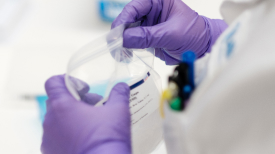- Cancer Care Team
Cancer Care Team
To deliver optimal patient outcomesProducts and Services
Cancer Type
Supplies & Tools
Scientific Focus
- Biopharma Partners
- Patients
- Education & Events
- Login
- Contact Us
Test Details
 Turnaround Time
Turnaround Time
5 - 7 days
Use
Systemic mastocytosis (SM) is a hematopoietic neoplasm characterized by an abnormal growth of clonal mast cells in bone marrow and other extracutaneous organs. Tyrosine kinase inhibitors, such as imatinib and avapritinib, have been evaluated to treat systemic mastocytosis.
Special Instructions
Please direct any questions regarding this test to customer service at 800-345-4363.
Limitations
This test will detect the KIT D816V mutation only. A negative result does not exclude the possibility that other mutations in KIT are present, or that the KIT D816V mutation is present below the test limit of detection. This test was developed and its performance characteristics determined by Labcorp. It has not been cleared or approved by the Food and Drug Administration.
Methodology
Nanoplate Digital PCR (dPCR); total genomic DNA is extracted and amplified using a multiplex digital PCR using wild-type and mutant-specific probes.
The assay is designed to detect the KIT D816V (KITc.2447A>T) mutation. Results are reported as percent mutated alleles. The mutation can be detected down to 0.03% mutated alleles.
Related Documents
References
Alvarez-Twose I, Matito A, Morgado JM, et al. Imatinib in systemic mastocytosis: a phase IV clinical trial in patients lacking exon 17 KIT mutations and review of the literature. Oncotarget. 2016 Jul 19;8(40):68950-68963.28978170
Akin C, Fumo G, Yavuz AS, Lipsky PE, Neckers L, Metcalfe DD. A novel form of mastocytosis associated with a transmembrane c-kit mutation and response to imatinib. Blood. 2004 Apr 15;103(8):3222-3225.15070706
Alvarez-Twose I, González P, Morgado JM, et al. Complete response after imatinib mesylate therapy in a patient with well-differentiated systemic mastocytosis. J Clin Oncol. 2012 Apr 20;30(12):e126-e129.22370312
DeAngelo DJ, Radia DH, George TI, et al. Safety and efficacy of avapritinib in advanced systemic mastocytosis: the phase 1 EXPLORER trial. Nat Med. 2021 Dec;27(12):2183-2191.34873347
Gotlib J, Kluin-Nelemans HC, George TI, et al. Efficacy and safety of midostaurin in advanced systemic mastocytosis. N Engl J Med. 2016 Jun 30;374(26):2530-2541.27355533
Gotlib J, Gerds AT, Bose P, et al. Systemic Mastocytosis, Version 2.2019, NCCN Clinical Practice Guidelines in Oncology. J Natl Compr Canc Netw. 2018 Dec;16(12):1500-1537.30545997
Gotlib J, Reiter A, Radia DH, et al. Efficacy and safety of avapritinib in advanced systemic mastocytosis: interim analysis of the phase 2 PATHFINDER trial. Nat Med. 2021 Dec;27(12):2192-2199.34873345
Greiner G, Gurbisz M, Ratzinger F, et al. Digital PCR: A Sensitive and Precise Method for KIT D816V Quantification in Mastocytosis. Clin Chem. 2018 Mar;64(3):547-555.29237714
Kristensen T, Vestergaard H, Møller MB. Improved detection of the kit d816v mutation in patients with systemic mastocytosis using a quantitative and highly sensitive real-time qpcr assay. J Mol Diagn. 2011 Mar;13(2):180-188.21354053
Reiter A, George TI, Gotlib J. New developments in diagnosis, prognostication, and treatment of advanced systemic mastocytosis. Blood. 2020 Apr 16;135(16):1365-1376.32106312
Valent P, Akin C, Metcalfe DD. Mastocytosis: 2016 updated WHO classification and novel emerging treatment concepts. Blood. 2017 Mar 16;129(11):1420-1427.28031180
Verstovsek S. Advanced systemic mastocytosis: the impact of KIT mutation in diagnosis, treatment, and progression. Eur J Haematol. 2013 Feb;90(2):89-98.23181448
Additional Information
KIT is a receptor tyrosine kinase involved in proliferation of mast cells, melanocytes, germ cells, and hematopoietic stem cells. Activation of KIT occurs upon binding of the stem cell factor ligand, which triggers autophosphorylation and dimerization of KIT. Activated KIT signals downstream protein kinase pathways, which induces cell proliferation and survival. The vast majority (>90%) of SM cases have a somatic A to T missense mutation at position 2447 in exon 17 of the KIT gene. This KIT D816V mutation (c.2447 A>T, p.D816V) results in the substitution of aspartate (D) to valine (V) at codon 816 in the kinase activation loop domain of the protein causing a conformational change in the receptor. This conformational change results in ligand-independent constitutive activation of KIT and leads to increased cell proliferation and accumulation in various organs, and a reduction in cell death. The detection of KIT D816V is one of the minor diagnostic criteria for SM per the WHO system. KIT mutation detection is correlated with the proportion of lesional cells in the sample as well as the sensitivity of the detection method employed.
Quantitative detection using digital PCR of the KIT D816V mutation may aid physicians in diagnosis and therapeutic monitoring of patients with SM. The reported values will allow clinicians to predict disease severity and/or monitor the effectiveness of treatment protocols and to detect increasing mutation levels that may be indicative of patient relapse. An effect of mutational dose on disease phenotype may also prove significant.
Specimen Requirements
Information on collection, storage, and volume
Specimen
Whole blood or bone marrow
Volume
3-5 mL whole blood or 1-2 mL bone marrow
Minimum Volume
3 mL whole blood or 1 mL bone marrow
Container
Lavender-top (EDTA) tube, green-top (sodium heparin) tube, tan-top (K2-EDTA) tube or pink-top (K2-EDTA) tube
Storage Instructions
Refrigerate. Stable for 72 hours at room temperature or refrigerated.
Causes for Rejection
Specimen does not meet collection criteria; frozen whole blood, marrow, or cell pellet; leaking tube; clotted blood or marrow; grossly hemolyzed specimen or otherwise visibly degraded; contamination by another specimen; specimens containing suspicious foreign material
Collection
Ship specimen at room temperature. Specimen should arrive in the laboratory within 48 hours of collection. If specimen is to be stored prior to shipment, store at 2°C to 8°C. Indicate date and time of collection on the request form.
Related Tests
Find more tests related to this one.



